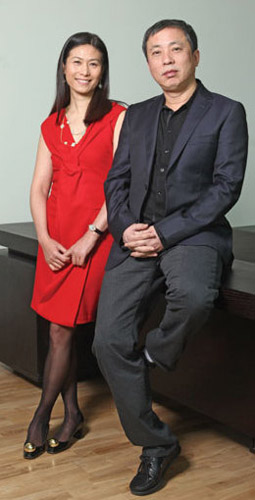Wang formerly worked in a Shanghai-based auction company for three years, during which she developed sharp eyes for good art.
Once she saw a painting depicting China's first generation of political leaders in the auction catalog, and found the image familiar. Then she realized it was on her childhood school textbook. "That piece inspired me and I started to buy red classic art," she says.
"These pieces should be kept in national museums. Only because of specific historical situations, they were out in the market. They reflect part of our collective memory, which should be passed on to future generations," she continues.
"Since our financial condition was improving, we started collecting them."
Ambitious plans

Owners of the Long Museum , Wang Wei and Liu Yiqian.
About eight years ago, the couple started to consider opening their own museum, where they could share their collection with the public. It cost them 200 million yuan to purchase the land and build it.
The building has four stories, and a total space of more than 10,000 square meters, half of which is for exhibitions. Wang declines to reveal the total number of artworks in their collection, but a new, even larger venue of the Long Museum will be built across the Huangpu River.
With an exhibition space of 16,000 square meters, it's scheduled to open on the west bank of the river in December.
"It's very costly running a museum," Wang says. Electricity alone costs more than 10,000 yuan every day. The admission of 50 yuan per person can only cover a tiny portion of the cost.
"We think a public service initiative like this deserves more support from the government," she says. "They can help us in many ways, such as taxation and electricity pricing."
The museum is so new that her office still smells of fresh paint. A website has just been launched, and a series of educational activities is being presented.
"We really want to provide something meaningful for the local community," Wang says. "As long as we can provide good service continuously, we will be able to ask for more support from the administration sectors."
Art lectures, workshops for art lovers and children, and tea parties are all planned for the Long Museum.
The museum chose its name after the Chinese pronunciation of dragon, the mythical creature that has become a widely recognized Chinese totem. Wang also hopes it can go on "long" as the name suggests.
Wang and Liu have four children. One of their daughters is studying art history abroad, and their youngest child, a teenage boy, is showing great interest in art too.
"I'd wish Long Museum will carry on to our next generation," she says. "We are all mortal beings, but spirits, ideas and art survive for thousands of years."
Liu and Wang have acquired most of their treasures at auctions in China. "We no longer buy in Hong Kong, because of the tariff concern," Wang says.
